It kind of trips me out to think about that, actually. I'd be curious to know what Carlos Lehder thought about my performance on Narcos. I don’t know if I’ll ever find out.
Perhaps you recognize actor Juan Riedinger from Netflix’s Narcos and his portrayal of real-life drug-running, Nazi-sympathizing playboy Carlos Lehder. In the 1980s, Lehder was a big player in the Colombian drug trade and known for steering cocaine-crowded planes for Pablo Escobar, the notorious kingpin of the Medellín Cartel who’s currently known to be serving a life sentence in prison. On Canada’s espionage thriller The Romeo Section, Riedinger steered the show as Rufus Decker, one of many “Romeo” or “Juliet” spies recruited to seduce secrets out of their intelligence targets. His film role in Colin Minihan’s It Stains the Sands Red is something different altogether.
It Stains the Sands Red opens on Las Vegas in smoking chaos, presumably already devastated by a zombie apocalypse. Fleeing that mess are Molly (Brittany Allen) and Nick (Merwin Mondesir), a crass duo whose alliance is vague. Not that it matters for long. Driving en route to a remote airstrip to get the hell out of Dodge, their car goes kaput near a lone, scraggly-haired, besuited zombie (Riedinger). Long/short, Nick’s journey ends here and panicked Molly is left to hoof it 36 miles to her airfield destination. The low-speed but no less determined zombie shambles after Molly—to be precise, the scent of her menstruation!—as things expectedly go tits up in more, unexpected ways.
Anthem spoke to Riedinger during the Busan International Film Festival in South Korea, where we’re stationed this week, after It Stains the Sands Red played in the “Midnight Passion” section.
Busan International Film Festival runs October 12 – 21. ISSR is available to view now on iTunes.
I was informed that you start shooting something tomorrow. What are you working on?
I’m doing a guest star role on Lethal Weapon. It’s cool because it’s a big show with lots of explosions and big-budget action sequences. I probably can’t say too much about my role or anything because this season hasn’t even come out yet. But I’m playing a pretty badass dude. We’re working on the Warner Brothers lot, which is always fun.
Do you still get nervous? Is there a lot anxiety leading up to the shoot days?
There’s always butterflies and I think you use that to your advantage. If there are no nerves at all, I think there’s probably something wrong. If you care about it, you should be a little bit nervous. When I started out, in the worst situations, the nerves were debilitating. I remember the very first time I did a professional gig: The director yelled, “Action!” and I just blacked out. I don’t even remember how the words came out of my mouth. I was so blindingly nervous. I remember the make-up person powdering me, like, “Are you okay?” because I guess I was sweating profusely. Then I watched the footage and it turned out pretty good, so I guess you wouldn’t be able to tell. It’s really kind of amazing what we train ourselves to do to get through that. At the end of the day, again, you can use it to your advantage. So I do get a little bit nervous, but not nearly as much as I used to. I think it depends on the project, too. If you’re playing a role that’s very different from everything else you’ve done and you’re working with very big-league people on a big-league show, then of course the stakes are higher and you do tend to get more nervous. With some roles, it feels very organic. It also depends on how your day is going. If you didn’t get much sleep the night before, your nerves are on edge. If you got a parking ticket when you got into your car that morning—anything can affect your level of anxiety and that seeps into the work, too. So I think it’s important to sort of step back and really take a breath and relax into it once you’re on set.
You also have a recurring role on Good Behavior, which is currently in its second season. You play this unstable guy named Teo. How did you get involved with that series?
This is kind of funny. So I went through pilot season this year and went on a bunch of auditions. I had some close calls, but nothing came of it, which is very common during pilot season because it seems like every actor on the planet is in L.A. auditioning for every single role. It’s a highly competitive environment. Anyways, nothing came of it and I was obviously a little bit disappointed and frustrated. Then this audition came through after that—a series that had already been running. I was going to a film festival that night and didn’t really have time to prepare for the role. It’s an Argentinian character and I didn’t know whether they wanted an accent or not. So I leave the festival to rush home and work on the material, and I can’t find my freakin’ car! I was running through this parkcade. My phone was dead at this point. I was in a panic. It literally took me an hour-and-a-half to finally find my car. I drive home all flustered, and by that time, it’s really late. I’m like, “Aw man, I just gotta go to sleep and hope for the best.” I went into the audition with Deb Zane—a very prominent casting director in town—and I didn’t realize how important she was. Had I known, I think it would’ve made it even more nerve-racking. But I got the part, without ever having to go back in again. I think part of it was the fact that I didn’t have a lot of time to prepare and overthink it. The stars just kind of aligned on that one. It was a really, really fun role to do.
It must’ve been fun to play a zombie in It Stains the Sands Red as well. It’s an impressive creature performance. Getting into that role must’ve been a different kind of animal for you.
Absolutely. I’d never played a zombie before. I’d worked with Colin [Minihan]—as part of the Vicious Brothers with Stuart Ortiz—on Grave Encounters and that’s how I met him. Then he approached me with this role, which was nice because I didn’t have to audition for it. But I didn’t know at first because there’s a danger of a zombie being very one-dimensional. Part of the challenge was, and they told me from the very beginning, we needed to sort of feel for this zombie and find a certain degree of humanity within him. Then of course, the whole physical aspect of the role as well. I mean, it was a lot of fun. The make-up was intense: It was about five hours of make-up and then there was the removal as well. I was actually so tired of having to put it on and take it off that I would sleep in it and just walk around the house where we were all staying in Vegas with the make-up. I was basically embodying the zombie while we were shooting and while we weren’t. I would go to the grocery store in the zombie make-up, scaring little kids. [Laughs] They mentioned Bub from Day of the Dead as a sort of inspiration because that’s a zombie that’s classically perceived as more sympathetic. So I watched some of that. I didn’t overly research the physicality of the zombie. I definitely didn’t go to “zombie boot camp,” like you do when you get on shows like The Walking Dead. A lot of it was just sort of playing around and putting myself in that headspace. When a zombie’s walking towards a bush, a zombie doesn’t think to go around the bush—they walk through it. My shins were pretty torn up by the end of this shoot. I feel like we did find a certain arc for Smalls [the zombie’s nickname in the film], which is what they wanted. And it was so amazing to act opposite Brittany Allen, who’s wonderful and sort of carried the film.
The Vegas shooting fresh on my mind, it was that much more unsettling to see the place going up in smoke, so to speak. It’s certainly not the first time zombies took over Vegas—Resident Evil: Extinction was placed there. What’s the underlying commentary do you think?
That’s a good question. I love Vegas. I go to Vegas multiple times a year because I play poker. It’s like a second home to me. I feel like Vegas represents the pinnacle of consumerism. It’s like Disneyland for adults. It’s bacchanalian. People just wanna party and have a good time.
Yeah, a place people go to sometimes with this nothing-to-lose mentality—and then lose it all.
Exactly. Vegas is also the juxtaposition of this high-dense population of people with these lavish structures and all the glitz and glamor, against the desert landscape. There’s absolutely nothing around it. It’s very surreal to think that something like that exists in the middle of nowhere. I mean, most of our film took place in the desert portion of Vegas. It was cool to see those characters trudging through the sand for an hour-and-a-half. We got cool scenic shots of the desert as well.
Was it absolutely scorching out there?
No, it was the opposite. It was freezing! [Laughs] The challenge was trying to make it look like it was scorching when we were in fact freezing our asses off. We shot it in December. Also, we had a lot of night-shoots, too. We were absolutely freezing during those nights.
I’m glad that you brought up your love of poker because that is something I learned about you. You really love poker. You even made a short film about it. I watched the vlogs you made from when you participated in the World Series of Poker’s “Colossus” event two years ago.
Oh no way! Wow. Well, I started casually playing with a group of friends who kind of introduced me to the game. I’m kind of wired for the game of poker. I love the combination of having to, not only read people, but also manipulate how you’re being perceived by others in order to get the desired result at the table. There’s also the gambling element, which I would argue is only a small part of it. There’s definitely a lot of skill involved: You have to be good with calculating your odds and figuring out what the best bet is to put in. I’m definitely more into tournament poker because I like the elimination aspect of it, rather than cash games, which has no end to it and you don’t know when’s a good moment to get up and walk away. That typically results in you losing all of your money. In a tournament, there’s a beginning, a middle, and an end already built into the format.
How often do you play?
I used to play a few times a week and now it’s a bit more difficult because my wife and I have twin boys who are 17-months-old. So that’s obviously my new focus. I don’t get as much time to play, but I still try to get a couple tournaments in a month if I can. Like I said, I love to go to Vegas. If I’m in Vegas, I try to play 24 hours a day if I can. [Laughs]
You shot Grave Encounters in an abandoned mental asylum. I know you don’t believe in the paranormal. Do you think it might’ve helped you if you did believe it in that sort of scenario?
You just have to do more acting, I guess. [Laughs] Yeah, I think it would actually be helpful if I was genuinely terrified of ghosts when I’m shooting a movie like that. I’m still skeptical. I’m the type of person that needs to experience something firsthand to really buy into it, and I haven’t. So it’s like any acting job. You always have to put yourself in that headspace. You convince yourself that you believe it, and consequently, you convince the audience that you believe it, too.
You were on Narcos, which everyone loves. You played that role entirely in Spanish, on location in Colombia. You flew an actual plane. That’s some place to end up for somebody who at one time wanted to become a veterinarian. When did you flip that switch?
In terms of deciding to be an actor, it started in my third year of university. I took an acting class and had a very encouraging teacher, Gail Hanrahan, who really implanted a confidence in me and told me that it’s something I could pursue when I had never thought about pursuing it as an actual career. That summer, I hopped in my car and drove to L.A. I was sleeping in my car for two months. I was trying to audition for absolutely anything I could. At that time in my life, I had made the decision to take the leap of faith and really pursue acting full force. Then in terms of going from idea to reality, it was definitely more of a slow-burn kind of grind for me. It’s not something that happened overnight. I’ve been at it for about 13 years now and it’s only more recently that things have gone to the next level in terms of the opportunities I’m getting. I kind of prefer to have it that way, to be honest. Had it happened right away, I might’ve been spoiled too quickly and then lost interest when things didn’t go my way. The fact that I did have to grind as much as I did gave me the appreciation for the craft that I need to make it more of a long-term endeavor.
You’ve made a dozen or so short films already. I understand that you have a desire to make a feature at some point. Is there a story that you’re keen on developing right now?
As a director, I really prefer to work from other people’s scripts. My only short that I wrote was the first one called Shark Out of Water, which was about poker. It was a subject matter that I felt more qualified to tell than a lot of people. That’s why I felt the need to actually write that story myself. I’ve actually been on the search for a [feature] script for years. I need to find a script that I can fall in love with and obsess over for many years of my life. Until I find that script, I don’t wanna make something just for the sake of making it. So in terms of a specific project that I want to develop, I don’t know what that’s going to be. I think it’s going to be something that organically falls on my plate and triggers something in me. I’ll know once I read it: “This is the one that I need to make.”
Do you still have a desire to play Che Guevara at some point, or has that changed?
That would be really incredible to get to play him. I think there’s a certain likeness between myself and Che Guevara. But also, he’s such an important, iconic, historical figure. I guess I could use my Spanish more. I feel like it would be such an incredible role to play. It’s funny because I just made that connection right now: Che was Argentinian and my character in Good Behavior is Argentinian as well. Maybe it’s the universe pushing me in the direction of playing my dream role one day.
Benicio Del Toro did Che, Antonio Banderas did Evita, and Gael Garcia Bernal did it twice with the TV movie Fidel and The Motorcycle Diaries. How would you make it different?
Maybe by getting a peek into more of his intimate and personal experiences because everyone associates Che with his political ties and his involvement in the Cuban Revolution. It would be really nice to get a glimpse into who he was as a person behind-the-scenes. I know certain films have definitely touched on that, but it would be a cool opportunity to explore that more. He’s such a badass dude. And I have played real-life people before, like Carlos on Narcos. I also played an artist named Peter White, who was from the Rocky Mountains and the town that I grew up in, in a film called Drawing Home. I did a series called When We Rise, where I played a gentleman named Jandro, and I actually got to meet him. Jandro was a close family friend of the key figures in the story that dealt with the gay rights movement in San Francisco. They introduced me to him when we were filming in San Francisco and we were just sizing each other up to see if it was a good match. [Laughs] I guess I did look like him to some degree. There’s a different pressure associated with playing existing people. When you’re creating a completely fictional character, you get way more creative liberties. With somebody people actually knew, you have a magnifying glass on you and you better do everything you can do deliver something that will capture that person’s essence.
And if that person’s still alive, it’s like, “Oh shit, they’re going to watch this?”
[Laughs] Carlos Lehder is alive!
Is he in prison?
He’s apparently in witness protection. Before I knew much about him, I was looking into possibly meeting him before playing him. I didn’t realize how impossible that would’ve been. Who knows if he has even seen the show? I mean, it would be awesome if he has. He was a very flashy character. He was a playboy with his own private island. I really had fun playing Carlos.
You know what? I would bet a lot of money that he watched Narcos.
Yeah, I would assume that he did. It kind of trips me out to think about that, actually. I would be curious to know what he thought about my performance. I don’t know if I’ll ever find out.
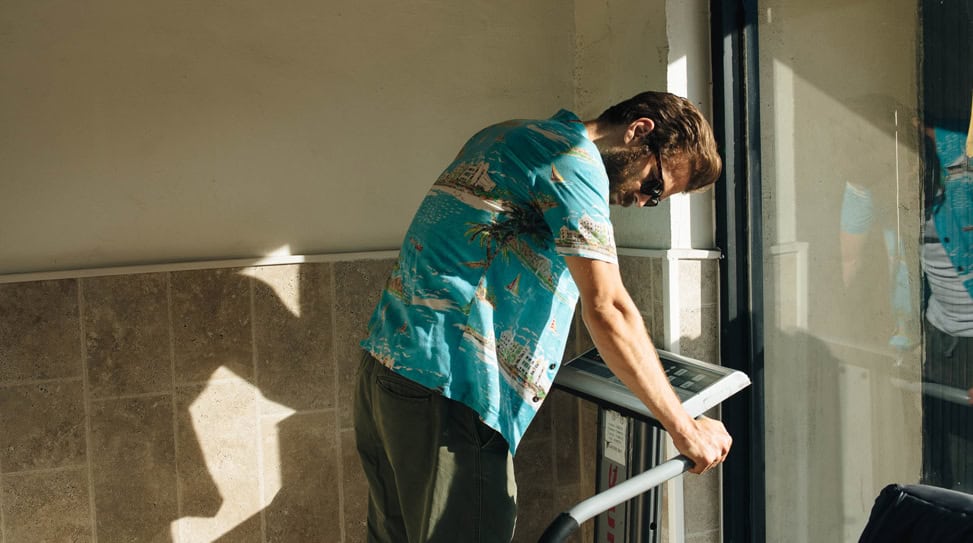

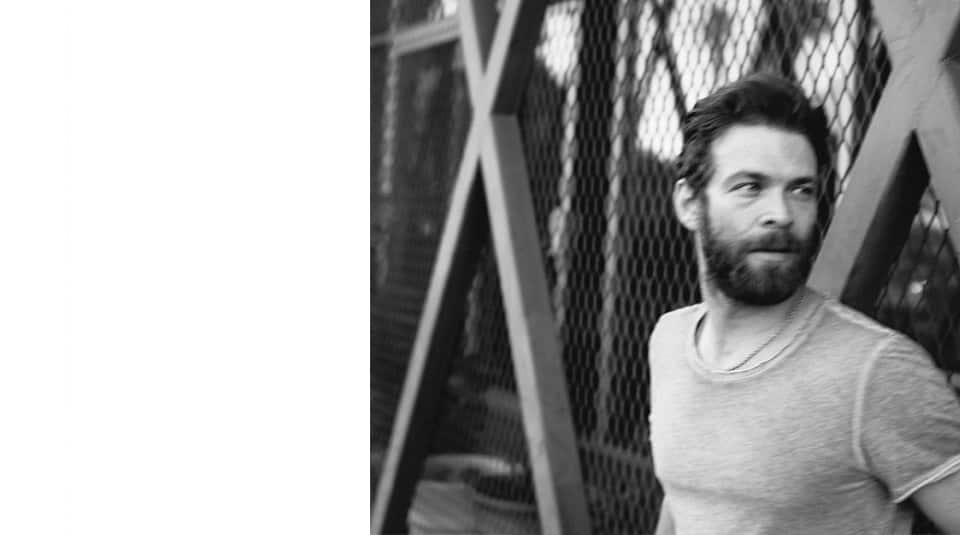
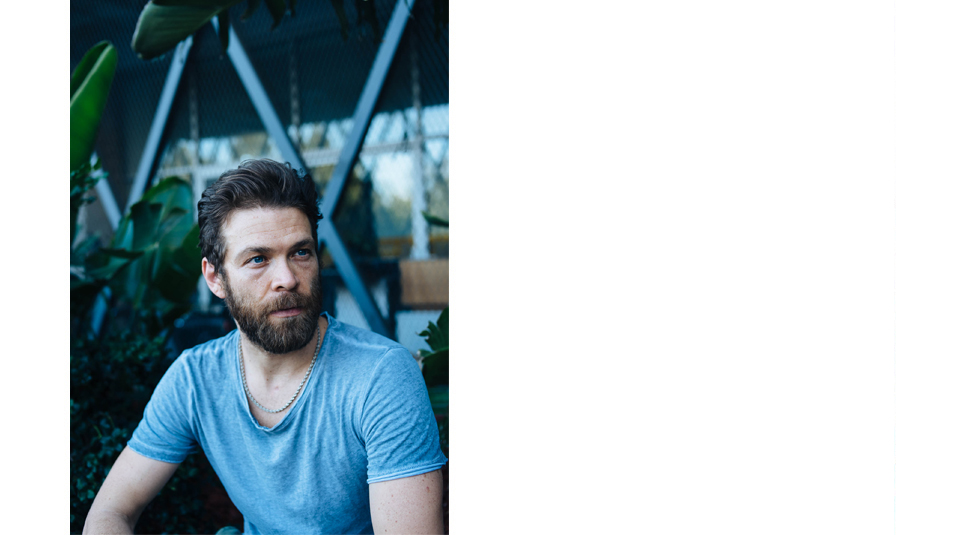
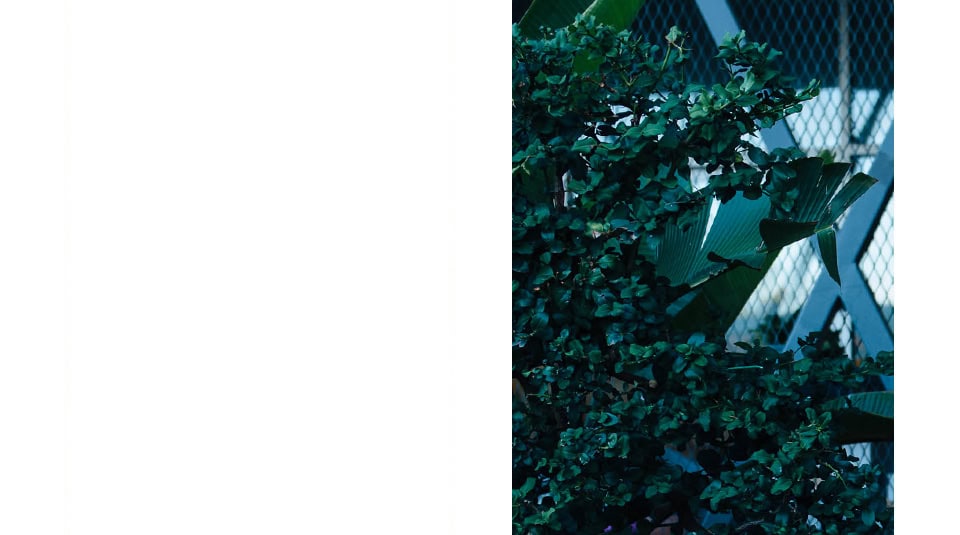
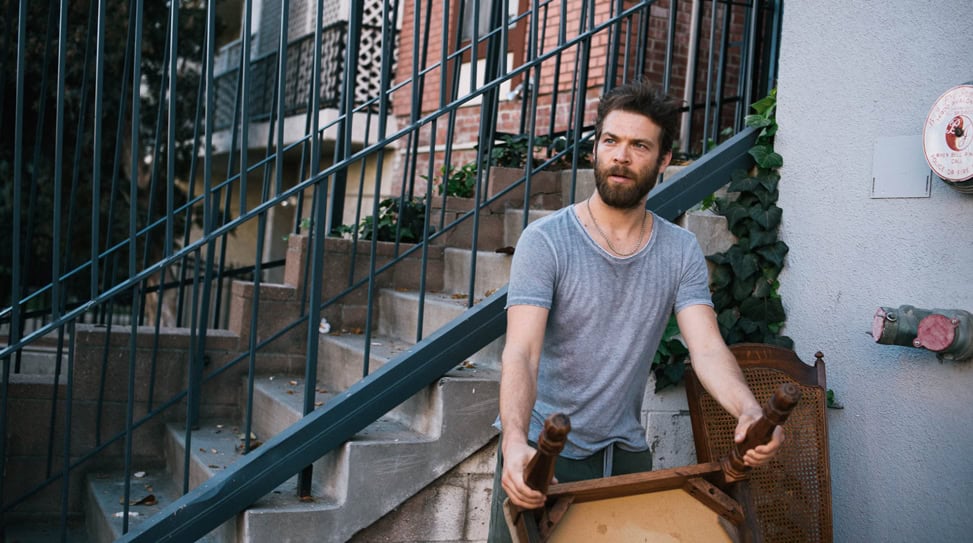
 A Conversation with Sean Wang
A Conversation with Sean Wang A Conversation with James Paxton
A Conversation with James Paxton
No Comments